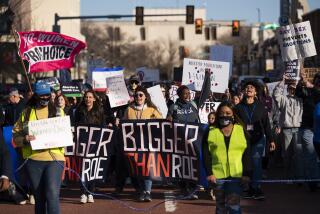State Rated Most Likely to Uphold Right to Abortion : Roe vs. Wade: Even if U.S. Supreme Court overturns 1973 decision, activist group says, California’s governor and Legislature are unlikely to alter positions.
- Share via
WASHINGTON — Thirteen states are likely to ban or severely restrict abortion if the Supreme Court overturns Roe vs. Wade, but not California, the National Abortion Rights Action League said Tuesday.
Gov. Pete Wilson and the majority in the state Senate and Assembly support the right to choose abortion, while the state Supreme Court has concluded that the right is protected by California’s Constitution, the abortion rights group said.
As a result, California poses the “lowest risk” among the 50 states of outlawing abortion even if the high court overturns Roe vs. Wade, the 1973 ruling that says the U. S. Constitution protects a woman’s right to an abortion.
The Supreme Court may hear a key abortion case later this year that could serve as a vehicle for overturning the landmark decision.
According to the Abortion Rights Action League, the 14.6 million women of child-bearing age who live in the 13 “highest risk” states, most of them in the Midwest and South, would be “at immediate risk” of losing their access to legal abortion if the high court reversed Roe vs. Wade.
“We are moving more toward Romania,” said Kate Michelman, the group’s executive director. Under the regime of the late Romanian dictator Nicolae Ceausescu, abortion was strictly forbidden, and women and teen-agers were forced to carry pregnancies to term.
Louisiana and Utah ranked as the states most likely to ban abortions immediately, the league said. Not only do their legislatures oppose abortion, but they have also enacted laws that would ban virtually all abortions. In both instances, the laws have been put on hold while they are challenged in the federal courts.
Next in line, according to the league, are Missouri, Pennsylvania, Ohio, Michigan, West Virginia, Mississippi, South Carolina, Alabama, Nebraska, Wisconsin and South Dakota. In those states, the governor opposes the legal right to choose abortion, as does a majority of the state legislatures, according to the league.
The right to abortion is safest on the West Coast, the league says. Besides California--the nation’s most populous state--other Western states classified as the “lowest risk” to restrict abortion sharply are Washington, Oregon and Hawaii. Connecticut, Vermont and North Carolina also are unlikely to ban abortions, the league said.
But Michelman cautioned that her group’s state rankings are based on a “snapshot” of the elected officials and their current views on abortion.
“That landscape can change dramatically tomorrow,” she said. “California may be the lowest risk state now, but reapportionment and election may change the Legislature and the state Supreme Court has not been tested on the fundamental right to choose since former Gov. (George) Deukmejian, who was anti-choice, made his judicial appointments.
“And California sends more anti-choice members to Congress than any other state,” Michelman said.
In California, other abortion rights advocates echoed that cautionary note.
“There is no security and no safety in our numbers,” said Robin Schneider, spokeswoman for the California Abortion Rights Action League. “Complacency and relying on the courts is just as dangerous in California as it is across the country.”
Schneider said that if abortions are outlawed elsewhere, women seeking abortions will probably turn to California, just as they did before the 1973 ruling.
In Los Angeles, Katherine Spillar, national coordinator of the Fund for the Feminist Majority, agreed. California “was a destination point before and it probably would be again.”
Spillar also warned that California’s status as a haven may be short-lived if anti-abortion candidates are elected to state office. She blamed the danger on what she called the underrepresentation of women in public office.
“Until we get equal numbers of women in the state Legislature, there is no guarantee that women’s rights and abortion rights will be protected,” she said.
At Tuesday’s NARAL news conference, Michelman said it is inevitable that the more conservative Supreme Court will overturn Roe vs. Wade, probably within the next year.
“George Bush will be held accountable by the voters for the loss of this fundamental right,” she said. Her organization expects to spend $4 million this year supporting candidates who favor abortion rights, including a Democratic challenger to Bush, she added.
In 1989, four members of the high court said they were ready to overturn Roe vs. Wade. Since then, Bush has appointed David H. Souter and Clarence Thomas to the court. Abortion rights activists believe that one or both will join the other conservatives in voting to reverse the Roe decision.
A key test will come soon. The court is expected to announce this month, possibly as early as Monday, that it will decide the constitutionality of a 1989 Pennsylvania law that requires pregnant women to notify their spouses and wait 24 hours before having an abortion.
Lawyers in the case have asked the justices to rule squarely on whether the “fundamental right” to choose abortion still exists. They noted, however, that the court could issue a narrow ruling that upholds the Pennsylvania law without ruling directly on the basic right to choose abortion.
Times staff writer Tracy Wilkinson in Los Angeles contributed to this story.
More to Read
Get the L.A. Times Politics newsletter
Deeply reported insights into legislation, politics and policy from Sacramento, Washington and beyond. In your inbox three times per week.
You may occasionally receive promotional content from the Los Angeles Times.











